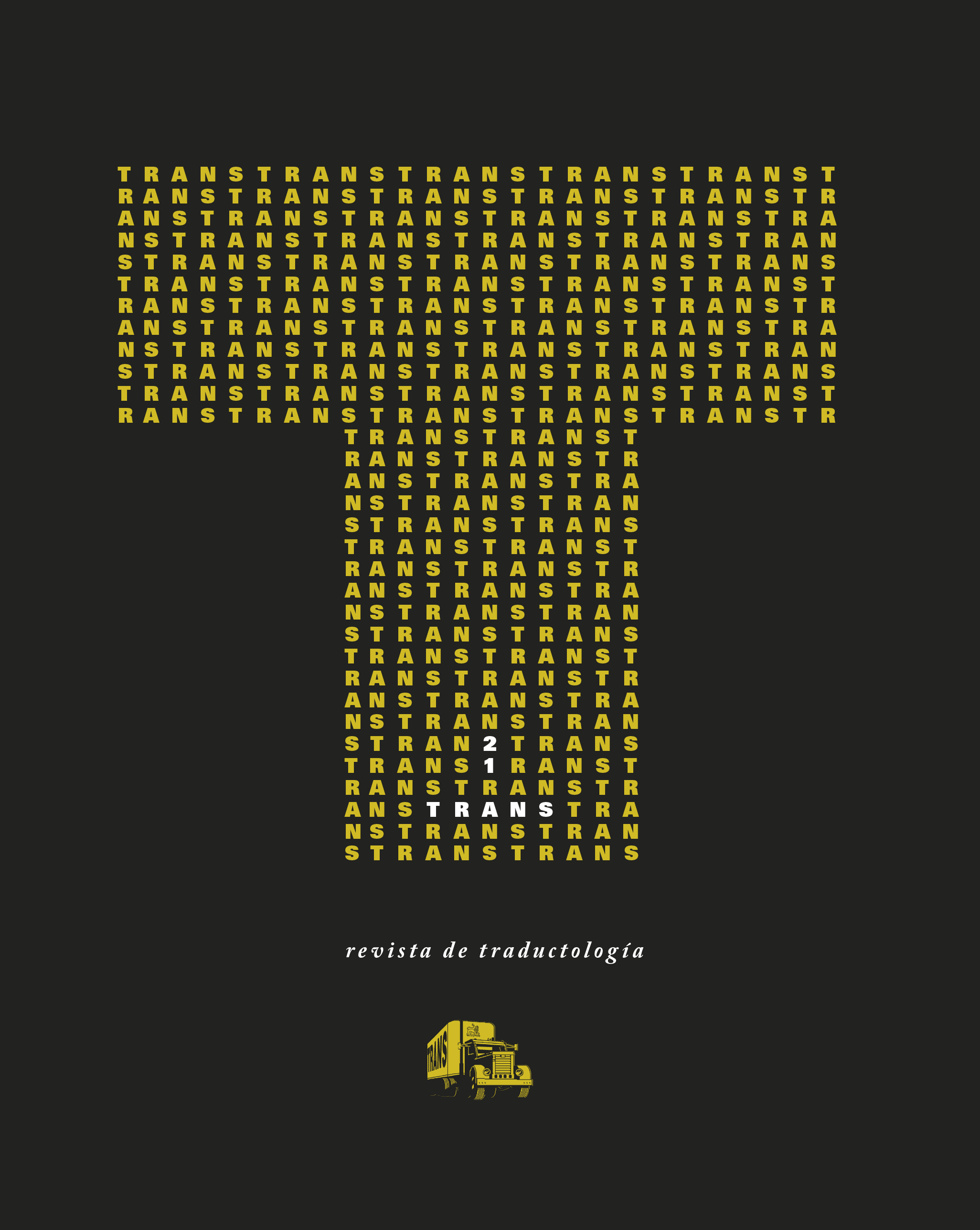Representación y traducción del camp talk en el cine de Almodóvar: los casos de "La mala educación" y "Los amantes pasajeros"
DOI:
https://doi.org/10.24310/TRANS.2017.v0i21.3655Palabras clave:
Camp talk, Almodóvar, La mala educación, Los amantes pasajeros, Subtitulado, IdentidadResumen
Este artículo aborda el estudio de Keith Harvey sobre el camp talk y su aplicación en el ámbito de la traducción. Tal y como describe este autor, el discurso camp se construye a través de distintas estrategias semióticas subyacentes capaces de dar forma a la identidad de una comunidad específica de hablantes. Así, según Harvey, es posible llegar a descubrir un patrón discursivo uniforme que identifica a todo un grupo mediante el uso de ciertos rasgos lingüísticos. A partir del marco descriptivo propuesto por Harvey, analizaremos las estrategias empleadas en español y en la versión subtitulada en inglés de dos de las obras con más estética camp del director Pedro Almodóvar (La mala educación, Los amantes pasajeros) con el objetivo de comprobar la utilidad y la pertinencia del camp talk a la hora de moldear una identidad concreta.
Descargas
Métricas
Publicación Facts
Perfil de revisores N/D
Información adicional autores
Indexado: {$indexList}
-
Indexado en
- Sociedad Académica/Grupo
- N/D
- Editora:
- Universidad de Málaga
Citas
Barrett, Rusty (1997): «The “Homo-genius” Speech Community», en Anna Livia y Kira Hall (eds.), Queerly Phrased. Language, Gender and Sexuality, New York: Oxford University Press, 181-201.
Butler, Judith (2007) [1999]: El género en disputa. El feminismo y la subversión de la identidad, trad. Mª Antonia Muñoz, Barcelona: Paidós.
Cameron, Deborah y Don Kulick (2003): Language and Sexuality, Cambridge / New York: Cambridge University Press.
Derrida, Jacques (1972): La dissémination, Paris: Éditions du Seuil.
Derrida, Jacques (1989) [1967]: La escritura y la diferencia, trad. Patricio Peñalver, Barcelona: Anthropos.
Foucault, Michel (1979): Microfísica del poder, trad. Julia Varela y Fernando Álvarez-Uría, Madrid: La Piqueta.
Foucault, Michel (1983): El discurso del poder, Ciudad de México: Folios Editoriales.
Harvey, Keith (1998): «Translating Camp Talk: Gay Identities and Cultural Transfer», The Translator: Special Issue, Translation and Minority, 4/2, 295-320.
Harvey, Keith (2000a): «Describing Camp Talk: Language/Pragmatics/Politics», Language and Literature, 9/3, 240-260.
Harvey, Keith (2000b): «Gay Community, Gay Identity and the Translated Text», TTR: traduction, terminologie, redaction, 13/1, 137-165.
Hayes, Joseph J. (2006) [1981]: «Gayspeak», en Deborah
Cameron y Don Kulick (eds.), The Language and Sexuality Reader, London / New York: Routledge, 68-77.
Keenaghan, Eric (1998): «Jack Spicer’s Pricks and Cocksuckers. Translating Homosexuality into Visibility», The Translator: Special Issue, Translation and Minority, 4/2, 273-294.
Kulick, Don (2000): «Gay and Lesbian Language», Annual Review of Anthropology, 29, 243-285.
Leap, William (1995): «Introduction», en William Leap (ed.), Beyond the Lavender Lexicon: Authenticity, Imagination and Appropriation in Gay and Lesbian Languages, New York: Gordon & Breach,
vii-xix.
Queen, Robin (1997): «“I Don’t Speak Spritch”: Locating Lesbian Language» en Anna Livia y Kira Hall (eds.), Queerly Phrased: Language, Gender and Sexuality, New York: Oxford University
Press, 233-256.
Ranzato, Irene (2012): «Gayspeak and Gay Subjects in Audiovisual Translation: Strategies in Italian Dubbing», Meta: Translators’ Journal, 57/2, 369-384.
Sontag, Susan (1964): «Notes on “Camp”», Against Interpretation, New York: Pan Books.
Spurlin, William J. (2014): «Queering Translation», en Sandra Bermann y Catherine Porter (eds.), A Companion to Translation Studies, Chichester: Wiley, 298-309.
Venuti, Lawrence (1998): The Scandals of Translation. Towards an Ethics of Difference, London / New York: Routledge.
Villanueva Jordán, Iván (2015): «“You better werk.” Camp representations of RuPaul’s Drag Race in Spanish subtitles», Meta: Translators’ Journal, 60/2, 376.
Publicado
Cómo citar
Número
Sección
Licencia
Todos los contenidos publicados en TRANS. Revista de Traductología están sujetos a la licencia Creative Commons Reconocimento-NoComercia-Compartirigual 4.0 cuyo texto completo puede consultar en <http://creativecommons.org/licenses/by-nc-sa/4.0>
Se pueden copiar, usar, difundir, transmitir y exponer públicamente, siempre que:
- Se cite la autoría y la fuente original de su publicación (revista, editorial y URL de la obra).
- No se usen para fines comerciales.
- Se mencione la existencia y especificaciones de esta licencia de uso.
- Compartir Igual — Si remezcla, transforma o construye sobre el material, debe distribuir sus contribuciones bajo la misma licencia que el original.
Los derechos de autor son de dos clases: morales y patrimoniales. Los derechos morales son prerrogativas perpetuas, irrenunciables, intransferibles, inalienables, inembargables e imprescriptibles. De acuerdo con la legislación de derechos de autor, TRANS. Revista de Traductología reconoce y respeta el derecho moral de los autores/as, así como la titularidad del derecho patrimonial, el cual será cedido a la Universidad de Málaga para su difusión en acceso abierto. Los derechos patrimoniales, se refieren a los beneficios que se obtienen por el uso o divulgación de las obras. TRANS. Revista de Traductología se publica en open access y queda autorizada en exclusiva para realizar u autorizar por cualquier medio el uso, distribución, divulgación, reproducción, adaptación, traducción o transformación de la obra.
Es responsabilidad de los autores/as obtener los permisos necesarios de las imágenes que están sujetas a derechos de autor.
Los autores/as cuyas contribuciones sean aceptadas para su publicación en esta revista conservarán el derecho no exclusivo de utilizar sus
contribuciones con fines académicos, de investigación y educativos, incluyendo el auto-archivo o depósito en repositorios de acceso abierto de cualquier tipo.













21.png)
